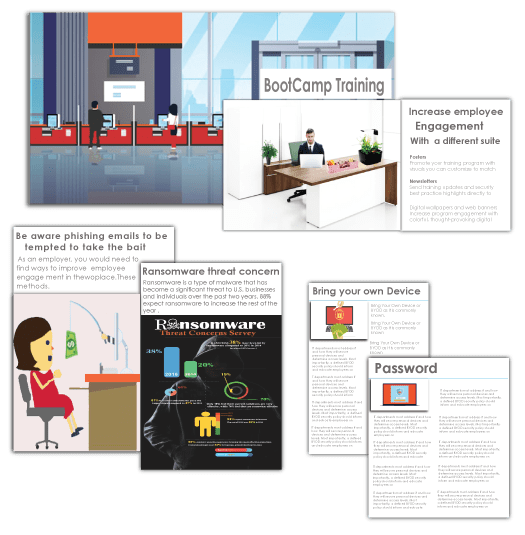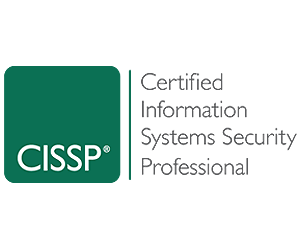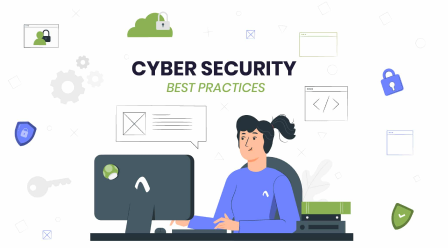The CISSP certification program improves your ability to define IT architecture as well as design, implement, and maintain a safe business environment using internationally recognized information security standards.The CISSP course covers industry best practices and prepares you to take the (ISC)² CISSP certification exam.
-
About this course
Access Control Systems, Cryptography, and Security Management Practices are among the topics covered in the CISSP: Certified Information Systems Security Professional Certification certification training program, which teaches students the eight areas of information system security knowledge.
-
Why should you take this course?
The CISSP credential validates your ability to plan, develop, and manage a world-class cybersecurity program.With a CISSP, you may prove your knowledge and join the (ISC)2, which gives you access to a wealth of special resources, educational tools, and peer-to-peer networking possibilities.
-
What will you learn by taking this course?
Earning the globally recognized CCSP cloud security certification is a proven approach to further your career while also improving the security of key cloud assets.The CCSP certifies that students have the advanced technical skills and knowledge needed to build, manage, and secure data, applications, and infrastructure in the cloud utilizing (ISC)2's best practices, policies, and procedures.
This course gives you the opportunity to demonstrate your abilities, progress your career, and obtain support from a network of cyber security experts who are here to assist you throughout your career.
-
Domain 1: Security and Risk Management
✅ Understand and apply concepts of confidentiality, integrity and availability
✅ Evaluate and apply security governance principles
✅ Determine compliance requirements
✅ Understand legal and regulatory issues that pertain to information security in a global context
✅ Understand, adhere to, and promote professional ethics
✅ Develop, document, and implement security policy, standards, procedures, and guidelines
✅ Identify, analyze, and prioritize Business Continuity (BC) requirements
✅ Contribute to and enforce personnel security policies and procedures
✅ Understand and apply risk management concepts
✅ Understand and apply threat modeling concepts and methodologies
✅ Apply risk-based management concepts to the supply chain
✅ Establish and maintain a security awareness, education, and training program
-
Domain 2: Asset Security
✅ Identify and classify information and assets
✅ Determine and maintain information and asset ownership
✅ Protect privacy
✅ Ensure appropriate asset retention
✅ Determine data security controls
✅ Establish information and asset handling requirements
-
Domain 3: Security Architecture and Engineering
✅ Implement and manage engineering processes using secure design principles
✅ Understand the fundamental concepts of security models
✅ Select controls based upon systems security requirements
✅ Understand security capabilities of information systems
✅ Assess and mitigate the vulnerabilities of security architectures, designs, and solution elements
✅ Assess and mitigate vulnerabilities in web-based systems
✅ Assess and mitigate vulnerabilities in mobile systems
✅ Assess and mitigate vulnerabilities in embedded devices
✅ Apply cryptography
✅ Apply security principles to site and facility design
✅ Implement site and facility security controls
-
Domain 4: Communication and Network Security
Implement secure design principles in network architectures
✅ Open System Interconnection (OSI) and Transmission Control Protocol/Internet Protocol (TCP/IP) models ✅ Converged protocols ✅ Internet Protocol (IP) networking ✅ Software-defined networks ✅ Implications of multilayer protocols ✅ Wireless networks Secure network components
✅ Operation of hardware ✅ Endpoint security ✅ Transmission media ✅ Content-distribution networks ✅ Network Access Control (NAC) devices Implement secure communication channels according to design
✅ Voice ✅ Data communications ✅ Multimedia collaboration ✅ Virtualized networks ✅ Remote access -
Domain 5: Identity and Access Management (IAM)
Control physical and logical access to assets
✅ Information ✅ Systems ✅ Devices ✅ Facilities Manage identification and authentication of people, devices, and services
✅ Identity management implementation ✅ Registration and proofing of identity ✅ Single/multi-factor authentication ✅ Federated Identity Management (FIM) ✅ Accountability ✅ Credential management systems ✅ Session management Integrate identity as a third-party service
✅ On-premise ✅ Cloud ✅ Federate Implement and manage authorization mechanisms
✅ Role Based Access Control (RBAC) ✅ Discretionary Access Control (DAC) ✅ Rule-based access control ✅ Attribute Based Access Control (ABAC) ✅ Mandatory Access Control (MAC Manage the identity and access provisioning lifecycle
✅ User access review ✅ System account access review ✅ Provisioning and deprovisioning -
Domain 6: Security Assessment and Testing
Design and validate assessment, test, and audit strategies
✅ Internal ✅ External ✅ Third-party Conduct security control testing
✅ Vulnerability assessment ✅ Code review and testing ✅ Penetration testing ✅ Misuse case testing ✅ Log reviews ✅ Test coverage analysis ✅ Synthetic transactions ✅ Interface testing Collect security process data (e.g., technical and administrative)
✅ Account management ✅ Training and awareness ✅ Management review and approval ✅ Disaster Recovery (DR) and Business Continuity (BC) ✅ Key performance and risk indicators ✅ Backup verification data Analyze test output and generate report
Conduct or facilitate security audits
✅ Internal ✅ External ✅ Third-party -
Domain 7: Security Operations
Understand and support investigations
✅ Evidence collection and handling ✅ Investigative techniques ✅ Reporting and documentation ✅ Digital forensics tools, tactics, and procedures Understand requirements for investigation types
✅ Administrative ✅ Regulatory ✅ Criminal ✅ Industry standards ✅ Civil Conduct logging and monitoring activities
✅ Intrusion detection and prevention ✅ Continuous monitoring ✅ Security Information and Event Management (SIEM) ✅ Egress monitoring Securely provisioning resources
✅ Asset inventory ✅ Asset management ✅ Configuration management Understand and apply foundational security operations concepts
✅ Need-to-know/least privileges ✅ Job rotation ✅ Separation of duties and responsibilities ✅ Information lifecycle ✅ Privileged account management ✅ Service Level Agreements (SLA Apply resource protection techniques
✅ Media management ✅ Hardware and software asset management Conduct incident management
✅ Detection ✅ Recovery ✅ Response ✅ Remediation ✅ Mitigation ✅ Lessons learned ✅ Reporting Operate and maintain detective and preventative measures
✅ Firewalls ✅ Sandboxing ✅ Intrusion detection and prevention systems ✅ Honeypots/honeynets ✅ Whitelisting/blacklisting ✅ Anti-malware ✅ Third-party provided security services Implement and support patch and vulnerability management
Understand and participate in change management processes
Implement recovery strategies
✅ Backup storage strategies ✅ System resilience, high availability, Quality of Service (QoS), and fault tolerance ✅ Recovery site strategies ✅ Multiple processing sites Implement Disaster Recovery (DR) processes
✅ Response ✅ Assessment ✅ Personnel ✅ Restoration ✅ Communications ✅ Training and awareness Test Disaster Recovery Plans (DRP)
✅ Read-through/tabletop ✅ Parallel ✅ Walkthrough ✅ Full interruption ✅ Simulation Participate in Business Continuity (BC) planning and exercises
Implement and manage physical security
✅ Perimeter security controls ✅ Internal security controls Address personnel safety and security concerns
✅ Travel ✅ Emergency management ✅ Security training and awareness ✅ Duress
-
What is the CISSP exam?
‘CISSP’ or the ‘Certified Information Systems Security Professional’ is considered to be the gold standard of all Information security certifications. The CISSP certification shows that “you have the knowledge and experience to design, develop and manage the overall security posture of an organization” (ISC)2 The exam tests you on eight domains which are ‘Security and Risk Management’, ‘Asset Security’, ‘Security Architecture and Engineering’, ‘Communications and Network Security’, ‘Identity and Access Management’, ‘Security Assessment and Testing’, ‘Security Operations’, ‘Software Development Security’
-
Am I qualified to take the exam?
If you have 5 years of full-time security experience in two of the eight domains of the (ISC)2 CISSP CBK(Common body of knowledge) you can definitely take the exam.
-
I am a ‘Security Analyst’ – do I need the CISSP?
Yes, if you are a ‘Security Analyst’ you will need the CISSP credential to boost your career. Here are some other job titles that could benefit from having the CISSP:
- Chief Information Officer
- Chief Information Security Officer
- Director of Security
- IT Director/Manager
- Network Architect
- Security Analyst
- Security Architect
- Security Auditor
- Security Consultant
- Security Manager
- Security Systems Engineer
-
I only have 2 years of full time experience – what should I do then to take the exam?
All is not lost when you have only 2 years of full time experience. You can take the exam and become an associate of (ISC)2 and can then work towards getting the required amount of experience.
-
Who conducts the CISSP exam?
The CISSP exam is conducted by ‘ International Information Systems Security Certification Consortium’ or (ISC)2
-
How will the CISSP credential help me in my career?
The Infosec domain is growing by leaps and bounds every day. The CISSP credential will help you in the following ways:
- You will be respected more in the InfoSec community
- CISSP certification will open the doors to new employment opportunities
- In spite of so many certifications being around, the CISSP certification is still “the” one certification that is demanded by most employers
- The CISSP will also pave the way for higher salaries
- Since the CISSP is a vendor neutral certification, you will be able to apply the skills to different technologies and methodologies.
- You will gain a deeper knowledge of the different domains in cyber security
- Key Features:
- Created by a Security expert :
- Access period : 12 months
- Course duration : 40+ hours
- Quizzes & revision exams :
- Certificate of completion :
- Support : 24/7 hours

Certified Information Systems Security Professional
Pick your preferred schedule
Why learn with us?
- We're tech career experts
- 25,000+ students worldwide
- Alternative to traditional university education
- Start a new career or advance your current one & land your dream job
- Award winning StudentCare
- Most in-demand skills for job market
- Partnered with most biggest accreditors in the world
- Exclusive student benefits

Reason to Choose Certified Information Systems Security Professional

- Exam Pass Guarantee (live online)
- 100% Satisfaction Guarantee
- Immediate access to Aspire portal for practice exam
- Get started with Certification pathway
- Knowledge Transfer Guarantee
- Take advantage of globally recognized platform
Included in your modules

Essential skills for your career
- (ISC)² and Security Fundamentals
- Cryptographic Client-based Systems
- Communication and Network Security
- Identity and Access Management (IAM)
- Site and Facility Security Controls
- Security and Risk Management (Part 1)
- Security and Risk Management (Part 2)
- Security Architecture and Engineering (Part 1)
- 2018: Security Architecture and Engineering (Part 2)
- Security Assessment and Testing
Find Your Boot Camp
Boost Engagement with delivering Communication Tools

Increase employee engagement with a different suite of communication tools like:
Posters
Promote your training program with visuals you can customize to brand... more
Newsletters
Send training updates and security best practice highlights directly... more
Digital wallpapers and web banners
Increase program engagement with colorful thought-provoking messaging... more
Training Videos/Animations
Strengthen key awareness concepts and skills through stylish visual... more
Why Aspire Tech
Award-winning courses
Aspire's award-winning online courses and programs are created and delivered by a renowned Cyber Security specialist.
The perfect fit for business
Plans for small to large businesses that are flexible to match your budget. There is a volume discount available.
Cost effective training
For a fraction of the expense of traditional classroom training, train thousands of employees in numerous locations.

